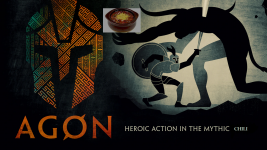Manbearcat
Legend
This is quite a reductive view of fiction! Take any story--A Tale of Two Cities, Star Wars, Parable of the Sower--keep the setting and the minor characters, but change the protagonists. Give them different personalities, motivations, and skill sets. Would the story change in a pretty fundamental way? Probably!
In an RPG, and adventure path provides some of the elements of a story, but it is incomplete. To make it complete, it requires characters. Who those characters are, the choices they make, and who they become can significantly alter the end story. How and the degree to which the adventure changes will depend on the style and temperament of the group.
It would be like describing Lord of the Rings by saying "Well there was this evil ring and yada yada yada some people (doesn't matter who, could've been anybody) threw it in a fire and the world was saved." The journey is the whole story!
@Campbell and @Ovinomancer answered this differently than I will.
I'd like to propose a thought exercise to you and to anyone else interested.
My Life With Master has extremely constrained scenario design. However, while the scenario is always the same, each game of MLwM is radically different from the last. A group of Minions (the PCs) serve a Master or Mistress which cruelly lords their power over a Town and its Folk. The object of the game is to (a) make connections with the Townsfolk (or not), (b) increase your Love and decrease your Self-Loathing, and (c) throw off the yoke of the Master/Mistress if you can (and therefore qualify for the endgame scene), and (d) either defeat the Master/Mistress, overthrow them/cast them out, or wilt and fail in the effort.
There are a few key similarities to Ravenloft here with profound differences riddled through the structure, the architecture, the resolution, and the disposition of play.
One thing I want to focus on that is an extremely distinct difference between D&D Ravenloft APs and a MLwM game:
Imagine if the players designed Strahd (mechanically and the attendant thematic conflict and tropes).
Imagine that.
That reorientation of Ravenloft would put D&D players in the drivers seat when it comes to so much of play (and I'm not talking about the skill here...a MLwM player has the deck stacked against them in a way that a Ravenloft D&D AP player has no concept of) that Ravenloft AP players have no orientation with.
That is a big deal here. When you decide the nature of the antagonist (and in both Ravenloft and MLwM, Strahd and the Master/Mistress start off as the actual protagonist...it is their dramatic need that drives play...it is the players' job to wrest the trajectory of play from the dramatic need of the villain...in MLwM by establishing connections/love, rising above your self-loathing, and rallying the Townfolk0.
In a Story Now game of Dungeon World's strain, it is the same thing; the players decide the nature of both the antagonists and the thematic conflicts that will undergird play. Not by writ of the process of actually making the antagonist, but via their playbooks, their PC build moves selected, their Bonds with other PCs/NPCs/locations/ideas, and their Alignment statements (ethos/beliefs/vows).
So in a Dungeon World game, why is Strahd (not Strahd...but the equivalent) an unnatural menace? Because the Druid's Alignment statement says he is supposed to be. Why does the nature of a prophecy around a Cohort become central (inputs into framing and consequences of moves) to a series of Paladin moves? Because the Paladin's Bond with the Cohort says it is supposed to be. Why are refugees who cannot defend themselves central to conflicts regarding the nature of family and tribe? Because the Fighter has a relationship with refugees (he was one) and has sworn to defend those weaker than him. Why is a Discovery result on a Perilous Journey a magical mystery? Because the Wizard's goal is to unravel a magical mystery.
Etc etc.
When the orientation of thematic conflict and the nature of adversary pivots on player ownership, it is very different than when that ownership is not a foundational component of play.



